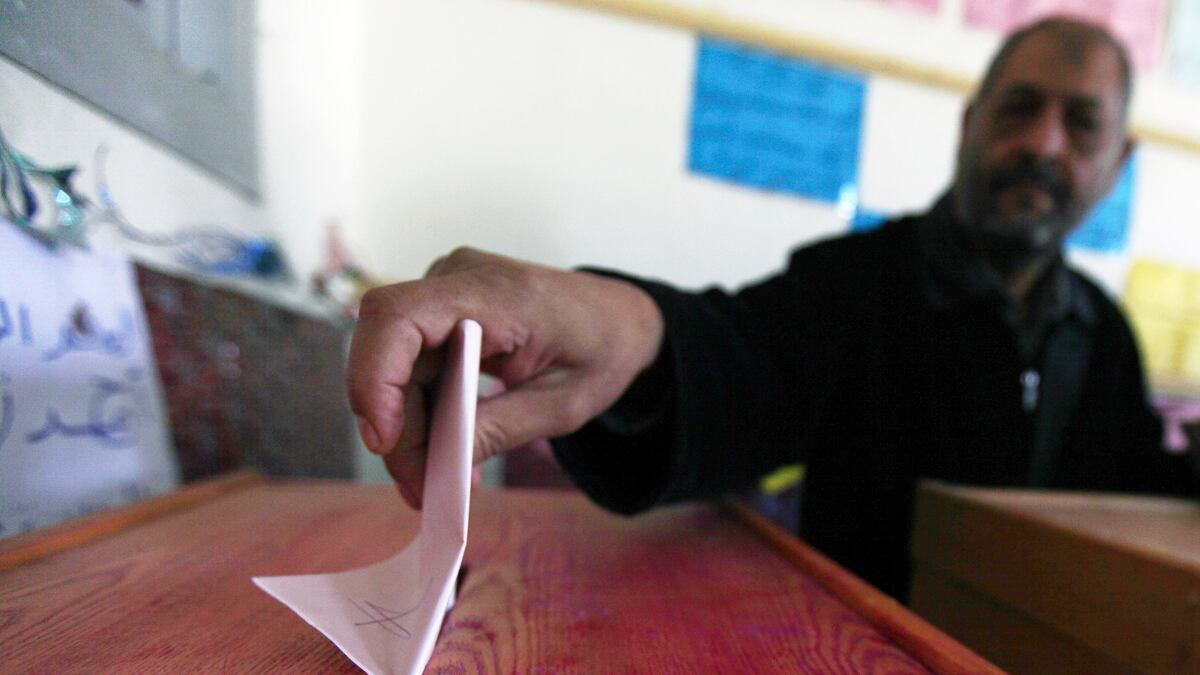Last night in Cairo, voters were tense ahead of the first round of Egypt’s long-awaited parliamentary elections. Hundreds of protesters huddled in the rain between Cairo’s Parliament and Cabinet building, part of a three-day-old gathering that could be considered the radical little sister of the ongoing demonstration in Tahrir Square. Just as the violent standoff between Tahrir protesters and the military started to ease over the weekend, the amoeba group had spread to the new location, resulting in another brief flurry of violence and one protester dead after being run over by an army truck. The demonstrators had effectively blocked the entrance to the newly appointed prime minister’s office, chanting, “The Stupid say: Elections!”
But when asked individually, protesters said they planned to go to the polls. “Of course I’m voting. All the people here are going to vote,” said Rania Gaber, a 23-year-old employee at Vodafone. Her friends echoed her sentiment. They said that while they weren’t optimistic about the elections—“the elections are a trick,” said one—they’d fill out a ballot all the same. “The election is a dead end, but we don’t have any other choice,” said another of Gaber’s friends.
As massive, bloody anti-military protests have flared up in Egypt over the past two weeks, many onlookers and Egyptians themselves have wondered gloomily whether the elections would even take place. The country has a long history of election-day violence, and this time around, some sort of disaster seemed almost inevitable. Some Egyptians suspected that the ruling military council would use the Tahrir protests as an excuse to delay the vote. Others foresaw bloodshed between supporters of rival political parties, and cast a wary eye to a pullback of police.
But Monday dawned warm and sunny in Cairo, and Egypt’s mood seems to have cleared up as well. In Maadi, an upscale neighborhood of the capital, traffic was brought to a complete standstill as voters flocked to the polls. At Kawmia primary school, a polling station for women (who vote in separate locations from men), two seemingly endless queues stretched down the block, packing the street and making it look like a mini-demonstration in itself. “Beautiful! Beautiful!” mused Omar Kandeel, a young politician as well as a a volunteer elections monitor with the Muslim Brotherhood, the main Islamist party in Egypt that was banned under Hosni Mubarak’s three-decade rule and that stands to see big electoral gains. Nights earlier, Kandeel had been in Tahrir Square, covered in tear gas residue as the violence reached its peak. Now, he pulled out his Android to record the turnout as he waded through the crowd. “Excellente!”

Reports from other neighborhoods in Cairo and from Alexandria and Port Said also reflected a huge, peaceful turnout. Voters have been jubilantly tweeting pictures of the long lines under the hashtags #egyelections and #egypt and marveling at the lack of discord. One voter tweeted, “Coptic lady next to me takes one look at two burly bearded guys and says ‘here come the troublemakers.’ They give her a chair. ‘Oh.’” Others reported waiting six hours in line, and recorded falafel vendors taking full advantage of the big crowds.
Basem Fathy, an activist monitoring the elections for an NGO, was stuck in an office all morning filtering crowd-sourcing feeds. The setbacks he described were not the diabolical kind: “The main problems are late openings of polling stations,” he said, and ballots without official government stamps. Leslie Campbell, the Middle East regional director of the National Democratic Institute, was in Cairo with a large contingent to observe the elections. He also ticked off nuisances like late openings and ballots being late to arrive, but he said these problems seem to stem not from malfeasance but from bad preparation. “When you combine that with the level of excitement, there are going to be some long lines, he said. “The election has clearly captured people’s attention.”
Jamal Himdan, a spokesman for the Muslim Brotherhood, said the group was so far pleased with the proceedings. “It’s going remarkably well,” he said. “The turnout is above all calculations and expectations, and we think that in itself will help the stability of the elections and the confidence of the people. Thus far it seems to be a very positive day.”
In Tahrir, protesters were reportedly taking shifts so some could go out and vote while others stayed in place to occupy the square.
Standing outside the Kawmia primary school, Yasmine Samir, a 25-year-old teaching assistant who had been waiting in line 90 minutes and still had hours ahead of her, said she remained cautiously optimistic about the country’s future. She’d been in Tahrir last week protesting against the military council. Still, she was determined to vote. “The people who died during the revolution died in order for us to be here today,” she said. “Even if it doesn’t work, it’s a step.”





